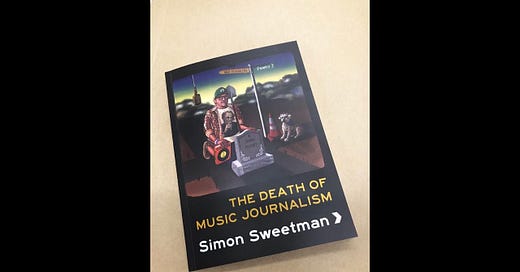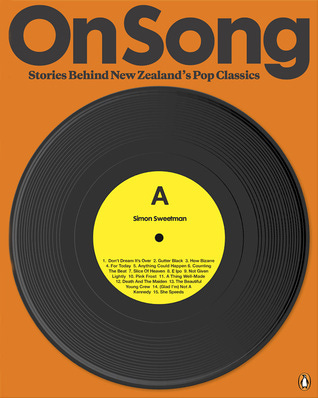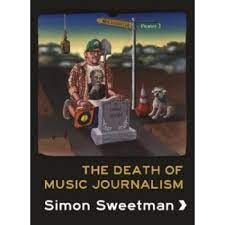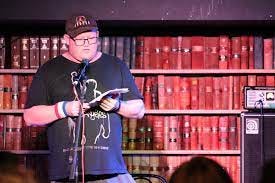Towards The Democracy of Poetry: New, Short Narrative Works
Wednesday is about books and writing. Today, the final essay from my Modern Poetry Honours Course. (With accompanying original poems).
Today I’m sharing the final assignment from my recent Honours Modern Poetry course. Last week I shared the Joni Mitchell essay, and a bit before that the Gil Scott-Heron one, for the final assignment we had to present 10-12 new poems and a contextualising essay that introduces our poetry and where it comes from. I found this a really fun assignment - and thought it might be of interest to share. Plus, I passed! Bonus! Some of the poems at the end of the essay are not exactly new but are newly re-worked, I’ve probably shared some of them in posts here before, but maybe you haven’t read them, and certainly they would have appeared in a different shape or form. The course also featured robust discussion and feedback of our work, so that was considered when presenting the final folio and poems. Anyway, I hope you find something here of interest…
I have been writing poetry for a lot longer than I have been writing anything else. I started writing about music in the mid/late 1990s, and from 2001-2016 I was the popular music critic for The Evening Post/Dominion Post and online at Stuff.co.nz. I freelanced for many other publications and spoke about music on TVNZ’s Good Morning and on RNZ. In 2012, I published a book about New Zealand music called On Song: Stories Behind New Zealand’s Pop Classics[1].
In 2020, Cuba Press published my first collection of poetry, The Death of Music Journalism.[2]
Writing in Landfall 242[3], Tim Saunders called the poems in the book entertaining and honest, he pointed to the music theme and connected that with nostalgia, and he rightly suggested that some of them were overly long and in need of editing.
When The Death of Music Journalism was released, I found myself answering the question of when I had started writing poetry, or even why I had pivoted to poetry, far more than I anticipated. I was 11 when I started writing poetry, 13 when I started taking it very seriously. I was about 21 when I first wrote a music review. At some point, the processes started to overlap. I realised a review could be a poem, or inform one. I realised a poem could be a review, or stand in place for one. Over the last half decade, I have been experimenting with this form a lot, taking music as a source for a memory, and therefore as a source for a poem.
I first admired this as a concept when reading Rick Moody’s short story collection, Demonology[4], one of the ‘stories’ was simply a list of various mixtapes, the song titles charting the development of the writer/narrator simply by being there – a song-title as indication of time, and then time passing. It wasn’t until I read Moody’s collection of music essays, published a decade later (On Celestial Music: And Other Listening Adventures[5]) that I fully “allowed” him to do that. It had been an intriguing magic-trick up until that point (something I lined up with the Owen Marshall short story, Pendragon[6] - by which I mean, simply, it was allowed to happen, but I couldn’t quite fathom it as actual story).
In between Demonology and On Celestial Music, the short stories of Moody, Marshall, and Raymond Carver were making their impact. I was floored by the economy. The pathos. The everyday drudgery being elevated – even in (sometimes) intentionally flat prose. Humdrum existences catalogued. I had enjoyed this in Charles Bukowski’s poetry, and short stories. Maybe more so in his novels. And I had felt it in a few other writers, but it wasn’t something I often saw in poetry.
My own poetry reading is eclectic, varied. But the prose poems of James Tate made a huge impact. And yet I couldn’t ever commit to the surreal in the way he does. So I started to formulate a way of cataloguing my real-life experiences, my love of music, my connection to it as a ‘place’, one combining physical geography and emotional nostalgia. The poem that eventually gave me licence was Ode To Mix Tapes by Sherman Alexie, from his 2010 story and poem collection, War Dances[7]. I had been attracted to Alexie as a short-story writer primarily. But Ode To Mix Tapes was the single piece of his that has had the biggest impact on my life:
Ode To Mix Tapes
These days, it’s too easy to make mix tapes.
CD burners, iPods, and iTunes
have taken the place
of vinyl and cassette. And, soon
enough, clever introverts will create
quicker point-and-click ways to declare
one’s love, lust, friendship, and favour,
but I miss the labour
of making old-school mix-tapes – the midair
acrobatics of recording one song
at a time. It sometimes took days
to play, choose, pause,
ponder, record, replay, erase,
and replace. But there was no magic wand.
It was blue-collar work. A great mix tape
was sculpture designed to seduce
and let the hounds loose.
A great mix tape was a three-chord parade
led by the first song, something bold and brave,
a heat-seeker like Prince with “Cream”,
or “Let’s Get It On”, by Marvin Gaye.
The next song was always Patsy Cline’s “Sweet Dreams”,
or something by Hank. But O, the last track
was the vessel that contained
the most devotion and pain
and made promises that you couldn’t take back.[8]
I sought to take everything I could from this. It was the first time I’d seen song titles and artist names in a poem, in this way. Just named. The inclusion was the poetic device. The inclusion was the meaning. The inclusion was shorthand for a whole world of nostalgia, and a hallmark of quality. I wanted to have a go at this sort of writing. I had been doing this in my daily blogs for Stuff.co.nz (Blog On The Tracks[9]) but I hadn’t been doing this in my poems.
I would take a few steps, tentatively towards this. Nostalgia and music working together, one helping the other. I like jokes – and so I would work to add humour into the line-up too. I have been very influenced by the flow and style of stand-up comedy. And in my times performing poetry – pub poetry, open-mic, performance-style – I have used humour in the introductions to the poems as well as in the actual pieces. But I wanted to move away from “punchline poetry”. I wanted to end well, still, but to bring in the humour of reflection, some whimsy, some sorrow even. Pathos.
Someone said of my poetry that I was “democratising” the form. And I liked that. The idea of making it accessible. I’m not sure who first said that about my work, but I believe it was in one of the reviews. At any rate, it was most certainly the aim. Poetry is – or can be – for anyone. But I think poetry scares people off sometimes – like jazz, or classical music, or arts festivals. The very word has a fright attached to it. People worrying they won’t ‘get’ it. I wanted to put together stories that worked in poetry form.
Here is one from the book that speaks to these points: Nostalgia, music, memory, family, everyday life, but also links back to my reading of poetry as a teen. And it’s shaped to reference the James Tate I adore but could never replicate. It was crucial as a piece for developing a ‘voice’ I felt, finally, was mine:
The End Of The Larkin Line
When the first Traveling Wilburys album was released, we took a drive into Hastings – Friday night, late night shopping…It was me and my brother in the back of the car (our usual spots) and mum and dad up front. They bought the album – on cassette tape. No CDs then – not in our house anyway. And so we drove in, got told on the way that the folks would be buying an ‘important’ album. And then, when home, and we all sat on the floor by the stereo and they played it. Mum and dad told us about how this was one of The Beatles, and the guy from ELO, and that Roy Orbison was a rock’n’roll legend. And Bob Dylan a poet and a prophet. Tom Petty was the young guy – the new kid on the block. But he’d been around the block riding on a tune or wo….we sat and listened to the album right through. And then again – a second time straight away. We were allowed to stay up late to take it all in (or try, at least).
They fuck you up, your mum and dad…and you hardly ever remember to thank them…[10]
This simple story of listening to the Traveling Wilburys with my parents also contains so much I remember (with warmth) about growing up. Friday night late night shopping, a new album for the family to bond with, and over. And in there the sharing of music as the sharing of an idea. The line, “Bob Dylan a poet and a prophet” is cribbing a lyric from a Red Hot Chili Peppers song. The reference to Tom Petty as a “new kid on the block” brings in a band of that time that I was probably supposed to be listening to (The New Kids on The Block) and of course the reference in the title and final line to Philip Larkin and his most famous poem (This Be The Verse), which interpolates a Traveling Wilburys song (The End of the Line) to make its own new meaning/punchline.
This was an early version of where I am at now with my work. Writing for me. But writing for an audience too. Absolutely. Maybe the audience doesn’t get every single reference – but they don’t miss out for not knowing. I’m dropping Easter Eggs in there, the way songwriters and filmmakers and stand-up comedians do. References on top of references. They’re there for you to find.
The Death of Music Journalism was put together like an album, it’s arranged in four sections, and contains pockets of autobiography. It shows music as an influence, as a bonding agent, as soundtrack for nostalgia, and as the actual nostalgia. But some of the poems were too long, and not tight enough. So, I’ve been working now on using shorter forms. And I like using the conversational language, and stories of the everyday, but arranging them in quite strict forms, four-line stanzas, poems that have a shape to them.
All of this comes from me rebuilding myself as a poet.
Around the time of the release of The Death of Music Journalism, I told someone that I’m a failed poet that has pieced myself together from those failings. I was looking neither for sympathy, nor a laugh – it’s just the truth as I see it. I tried all sorts of styles, and none of them stuck. I was looking for my voice. I have it now. It has stuck with me. And it makes sense to me. I feel all of the writers I have named in my work. I feel their words resonating. I’m in debt to so many songwriters too – again, some I’ve named here, but also people like Joni Mitchell, Paul Kelly, Suzanne Vega, and Paul Simon. They all write little stories into their songs. They all look back in their songs, to their childhood, to the way the world has changed as they have grown up in it, they have a line or two that sticks out, often a killer last line, or one that cements the idea, links up with the title, or the chorus, and indeed the mood.
I can only hope that I’m getting close to doing that in some of my work presented here. I like rhymes, I enjoy the internal ones that chime. I aim for poems that feel ‘fun’ to read and hear, even when telling a story that is sometimes darker, grim, or an examination of the more humdrum moments within an everyday life. I like puns and wordplay, but at the heart of it all, I am trying to share a story. Usually an autobiographical story.
*
One New Year’s Eve
A mate of mine – not a mate anymore – used to
carry with him a card; picture of a monkey
swinging from a tree…well, chimpanzee, but we
all call them monkeys when we’re telling the stories…
He’d laugh when we’d ask why he carried that card.
Telling us we’d never know when it might come in handy.
We all went along with it – “he’s mad”, we’d say, laughing –
little did we know…and then we knew… and we didn’t want to.
One new year’s eve you were walking along with him,
the pubs all boring, the queues all long or else the bar was dead,
nothing in-between… then he tapped a guy on the shoulder,
as you waited in one queue.
(‘Uh-oh’, you thought, but still hoped for the best).
Next thing: ‘And what did you say, cunt?’ said
your friend, your pal, the meathead… ‘You getting
smart cunt, you getting smart cunt, you getting smart, eh?’,
he said to a person whose lip was buttoned, who didn’t say
a thing and possibly, in that moment couldn’t for the fear
enveloping him. Next thing: bang! A big smack
behind his ear. Dull thud, as he hit the concrete – a horrible sound.
And your mate laughing, for no apparent reason. the madness
enveloping him, alive with the glow of too many beers.
And then the bouncer grabbing him, they wrestled for not too long.
“Back pocket, mate”, your friend had said, lost deep inside
his own movie and long ago. He signalled to his wallet, the
bouncer opened it with a shrug. “Well, you’ll want some ID”
your mate said, elated. handing him
the card with the monkey on it
from the weetbix packet.
The Most Learning I Ever Did At School Was On A Field Trip To The Abattoir
We watched the cows get loaded up
the ramp where they walked to their
death, a fear in their eyes. They put
their heads down low as the bolt went
through their ear. And then a big dull
sound as they hit the floor. A chain
dragging them, one-by-one, by the ankle
and lifting them up to hang in stench.
And then a guy would walk forward and
put a huge blade to the stomach, a gush of
blood hit his boots and the concrete floor,
as he pulled guts and bits – that already
looked like so many sausages. These were
flung to the side without regard and the
chain would swing the body to the side,
and it would begin again. And again.
We stood frozen for a bit. Then we were
herded along to the next stop. No bolt in
our ear – but as we made it to the end of
the line we were gifted a cow’s eye in a bag.
These were thrown about on the bus, slipped
down the back of girls’ uniforms; remaining
ones poured, like pet goldfish from a bag,
to hide at the bottom of drinking fountains.
Let’s Just Say
The man with the bottle of milk
on the table will soon take it home
and his family will be grateful. They
won’t ever know how grateful to be.
He nearly didn’t make it, nearly took
another path. I can’t say why, or how.
I know. I was only watching him for
a minute. A split second later it might
have been very different. Let’s just
say he made the right choice.
Petrichor
I wish I knew where I was
in my life when I first learned
the word ‘petrichor’ – and
shortly after, its meaning.
Or, long before when I
first took in that smell;
summer taking its pause,
I do remember first thinking.
Making American Recordings
Johnny Cash and his guitar
in a room, with the ghosts
of the men he used to be.
That’s the way to make
new history. Take the last
quarter century and put it
in the bin. Make the song
the thing. Make it
the only thing. Let the song
ring out its truth. Let
the song sing. Music finds
its way out. Truth knows
the way back in. Journeys
on trains. Waving in tunnels.
Plastering The Cracks
The stereo was playing
“Why Can’t We Be Friends”
the day I told my best friend
of over a decade that he had
to get the fuck out of my house and
my face – in either order – and that
we were done.
And that’s neither poetic device nor
poetic justice – it’s just the facts.
You remember what song was on
when you’re telling someone you’ve
known that long to please-and-thankyou
get out of your life.
He stood in anger, said he should
knock me the fuck out. I told him
to go for it. Or, you know, even better,
just go. He held a fist to my
face and everything was shaking.
I managed to duck but the wall didn’t have
the same luck. It took quite a while to
plaster over the cracks.
Half Time at the Housewarming, The Fire Roaring, The Pass-Around Food is
Lovely…
Eventually ol’ Fitzy or Trev or Mucka or Graeme or
whatever the name was, asked me what sport was my
favourite – my rugby-bluffing had been going about as well
as the game itself. I told him I watched a lot of basketball –
and loved it. And he gestured, adding “oh yeah, the hat”. And
then I blank-faced and added that my favourite sport to watch –
my absolute favourite – is snooker. That put him in a tight spot.
I tell you if his mouth was a goal anyone could have scored – it
was wide fucking open. He laughed and asked if I was serious. And
I said “deadly” and managed to look deadly serious which is my gift –
in exchange for never smiling. And we talked about Pot Black and
Hurricane Higgins and Steve Davis, Dennis Taylor, Stephen Hendry,
Jimmy White and of course Ronnie O’Sullivan. But I might as well
have been saying lithium magnesium sodium silicate – since he was
still wide-mouthed and waiting, just waiting for the second half to begin.
Then it did. And we talked about the rugby again.
A Mate of Mine, Yet Another Rugby-Tragic, was Surprised to Know I Even Cared about Basketball.
“I don’t get basketball
at all”, he said.
“It’s just, you score a point, then I will,
then you, then me, then you, then me…”
He did his best to make that sound
like it was a bad thing.
I let him score his point.
Then went home to watch
a 35-year-old replay of the game
where Larry Bird scored
half of his points left-handed
– and told people after
he was saving “his good hand”
for a more worthy opponent.
Girls And Boys At The Havelock North Public Swimming Pools
We were 16 and the girls were 14
and they hung around us for a summer
and we liked to think that we were
obviously cool, and the girls were
part of our gang – which proved it.
But when they moved on, and we
didn’t, the realisation was we’d been
used like a set of training wheels.
And fair enough. This is not a late
in life realisation.
I remember thinking it at the time.
They were far too cool for us, despite
being young. We were never cool.
They made us feel or seem fleetingly
cool. Then they took that away.
It wasn’t even like a band-aid rip.
It just happened. We barely noticed.
They moved on. We stayed the same.
We didn’t have extra confidence
as a result. We didn’t have anything.
Church Is A Verb
(with thanks to Margot Pierard)
She is singing Blackbird a capella.
As the family grieves, the vocalist offers
a hug they can hear. A scaffold to
really hold them in the moment.
The voice uplifting, almost quite literally.
There’s a church for all of us, we don’t
need to always be there. We just
need to know it’s always there.
The Signs Along The Way
I love the music the Carpenters made.
Nearly every sha-la-la-la, and probably
most of the wo-oh-wo-woes still shine.
But Richard was weird.
And Karen was scared.
And when you see that you start to hear that.
And it’s not that it makes the music better –
or worse. But it’s hard to not know it once you feel it.
And Richard was afraid.
But Karen was sad.
I love the music the Carpenters made.
It’s Yesterday Once More.
Goodbye To Love.
We’ve Only Just Begun.
The sadness hangs there within
the frame. The songs still shine.
Another Hole
Richard had said that his grandmother was dead.
That was how he got out of work after only one week.
It had been a long week, for sure. Starting at 7am, and
not finishing until 6. In the shop, sole charge, selling
snacks to people on their way in or out from the
station.
He had taken the job because he needed to contribute,
rent and other expenses. He’d been freeloading for weeks,
and you had demanded he find a way to actually pay.
But five days in a row: Punch a clock. That didn’t work for
Richard. Not when there were people to punch, and bottles
to smash – and huge highs to reach from both.
He made the call, on the final day of that week. Explaining
the “death” and how he’d have to travel “down south”.
Off the phone, and a sickening grin. The plan was fool proof,
and he had nailed it. “He said he was really sorry to hear that
and all the best Richard”. And you pointed out that none
of it was real. The kind words were tricked out of the boss.
Richard repeated it louder, block caps: “HE SAID HE WAS
REALLY SORRY TO HEAR. AND ALL THE BEST
RICHARD”. It was frightening to see another world opening.
The one where Richard thought he could live. And then with
his first and final pay he bought a big bottle to celebrate. And
knocked another hole in your wall.
Diminishing Returns
The Gunslinger is quick,
but only has
one trick.
The Trickster is fun,
but doesn’t have
a gun.
The Writer works
with words, but it’s
not really working.
*
[1] On Song, Simon Sweetman, Penguin, October 2012
[2] The Death of Music Journalism, Simon Sweetman, Cuba Press, October 2020
[3] Landfall 242 , Lynley Edmeades (ed.), University of Otago Press, 2021
[4] Demonology, Rick Moody, Little, Brown & Company, 2001
[5] On Celestial Music: And Other Listening Adventures, Rick Moody, Bay Back Books, 2012
[6] Coming Home In The Dark, Owen Marshall, Vintage, 1995
[7] War Dances, Sherman Alexie, Grove Press, 2010
[8] Ibid.
[9] Blog On The Tracks, Music Blog, Simon Sweetman, Stuff (2007-2016)
[10] The Death of Music Journalism, 2020








Fantastic rereading this. Just finished rereading a Bukowski story about Kid Stardust and the abattoir